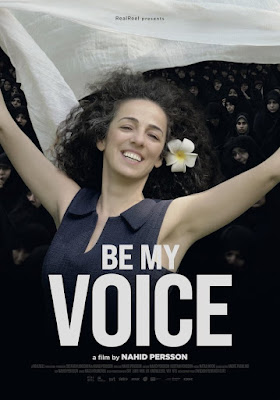The downside of social media is all too obvious (polarization, trolling, cat memes), but there are positives worth noting. You can get news directly from human rights activists around the world, uncensored and unfiltered, at least until they are arrested, like Joshua Wong was in Hong Kong. You can still join Masih Alinejad’s hundreds of thousands of Twitter followers (in fact, I recommend it). Alinejad’s social media savvy has made her a particularly annoying thorn in the side of the Iranian regime, but her prominence has cost her dearly. Nahid Persson captures Alinejad’s highs and lows as she continues her campaign against the fundamentalist regime in Be My Voice, which screens as part of this year’s DOC NYC.
It is immediately clear why the regime is so threatened by Alinejad. She has boundless energy and superstar charisma. She regularly delivers news from the Iranian streets to her army of followers on various social media networks and her VOA Persian broadcasts. As a result, most of her family back in Iran was forced to renounce her. The brave exception was her brother Ali, who served as her link to their parents and other siblings. Of course, identifying pressure points is one of the things oppressive governments do best. Consequently, they target him during the course of Persson’s scheduled filming with Alinejad.
Clearly, Alinejad’s overflowing sincerity is both her greatest strength and weakness. We can see only too well how deeply she feels everything. Sometimes her temper might be her second biggest enemy, but her passionate commitment is real and her enthusiasm is admirable. It is those qualities that built her extensive following in Iran, including a number of women (of all ages), who have publicly challenged mandatory chador laws, sending her videos of their defiance. If you are less than thrilled with face-masks, just imagine how much fun headscarves (or burqas in particularly restrictive Islamist nations) must be.
Weirdly, Persson’s documentary never addresses the plan to abduct Alinejad that was foiled by the FBI. However, there were more than enough crises going on during this time for both her and her subject (Persson’s friend, dissident journalist Ruhollah Zam was abducted and ultimately executed around the time Alinejad’s brother was arrested). Frankly, this is an acutely personal film, but it not just about Alinejad. We also hear plenty from the mothers grieving children murdered at protests and women who suffered disfiguring acid attacks, who shared their stories with her.
Throughout it all, Alinejad’s personality drives the film, with her outrage and compassion. Yet, it is important to take note of the abduction scheme, because it shows the regime was willing to commit violent acts on our soil. It means we all have a stake in her fight. Persson’s doc My Stolen Revolution also had considerable merit, but her portrait of Alinejad is more emotionally resonant and has greater urgency. Very highly recommended, Be My Voice screens in-person Tuesday (11/16) and online 11/17-11/28, as part of DOC NYC ’21.

